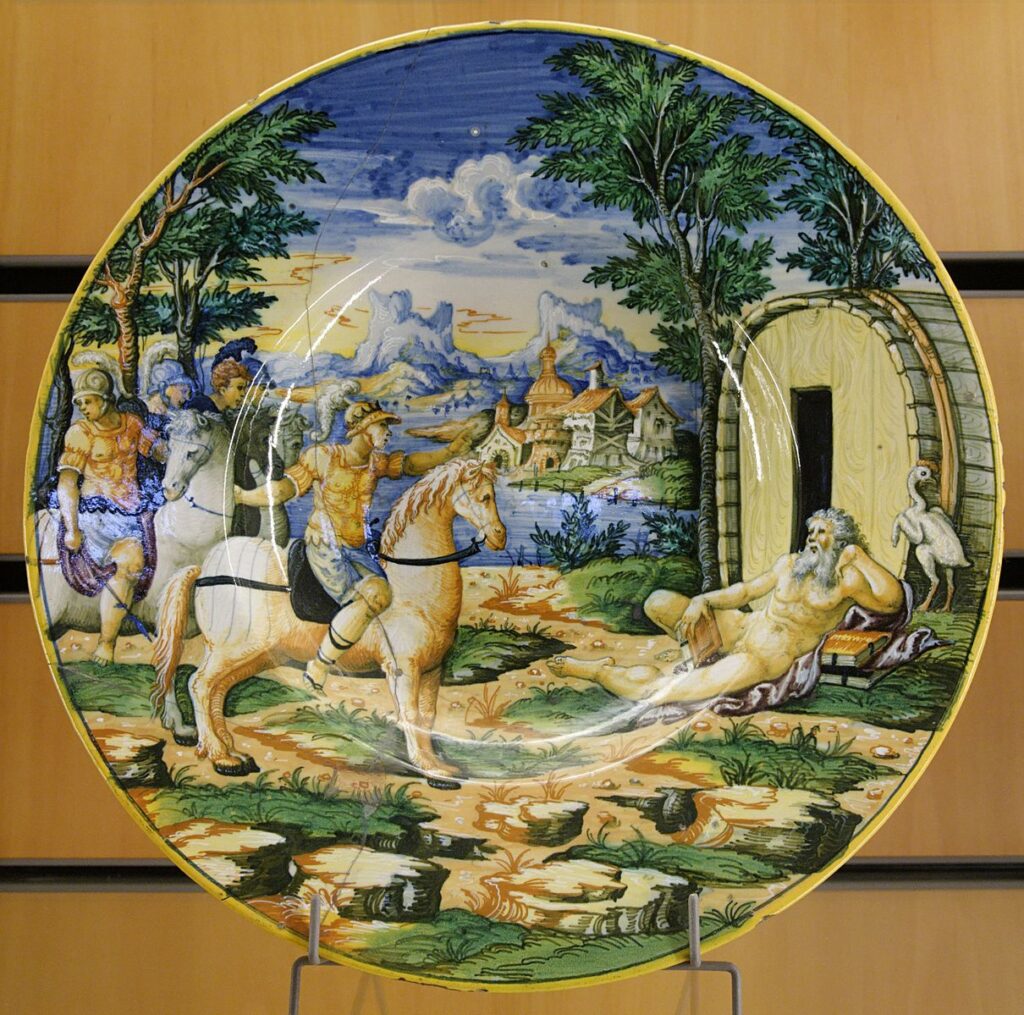
Now when Alexander the Great appeared before the Greek leaders in Corinth, they greeted him warmly and paid him lavish compliments – all of them, that is but one. A funny fellow, a philosopher named Diogenes.
Diogenes had views not unlike those of the Buddha. According to him, possessions and all the things we think we need only serve to distract us and get in the way of our simple enjoyment of life. So he had given away everything he owned and now sat, almost naked, in a barrel in the market square in Corinth where he lived, free and independent like a stray dog.
Curious to meet this strange fellow, Alexander went to call on him. Dressed in shining armour, the plume on his helmet waving in the breeze, he walked up to the barrel and said to Diogenes: “I like you. Let me know your wish and I shall grant it.”
Diogenes, who had until then been comfortably sunning himself, replied: ‘Indeed, Sire, I have a wish.”
“Well, what is it?”
“Your shadow has fallen over me: stand a little less between me and the sun.”
Alexander is said to have been so struck by this that he said: “If I weren’t Alexander, I should like to be Diogenes.”
Source: “A Little History of the World” by E.H. Gombrich
Source: http://www.rogerdarlington.me.uk/
Here is another anecdote of the encounters between Alexander and Diogenes:
When Alexander was leaving for India he went to see Diogenes, a great sage of the times. Diogenes asked Alexander, “Where are you going and for what?”
Alexander said, “I am going to conquer Asia Minor first.”
Then Diogenes queried, “And what will you do after conquering Asia Minor?”
“I will then go to conquer India,” said the would-be conqueror.
“And what then?” asked the sage.
And the answer was, “I have to conquer the whole world.”
Diogenes was lying on the sandy bank of a river; he was completely naked and enjoying the morning sunshine. He asked again, “What will you do after you have conquered the world?”
Alexander said, “Then I will rest and relax.”
This reply of Alexander’s sent Diogenes into loud laughter, and he called his companion, his dog, who was sitting some distance from him. When the dog came to him Diogenes said, addressing the dog, “Listen to what this mad king is saying. This man says that he will rest after he conquers the world. And here we are resting right now without conquering a single place.” And he said to Alexander, “If rest is your ultimate objective, why not join me and my dog right now on this beautiful river bank? There is enough space here for us all. I am already resting. Why are you going to create so much trouble and disturbance around the world just to rest at the end of it all? You can rest right here and now.”
An embarrassed Alexander then said, “What you say seems to be very sensible, but I cannot rest right now. Let me first conquer the world.”
And then the sage said, “There is no connection whatsoever between world conquest and rest. Here I am, resting well, without having to go in conquest of the world.”
“There is meaning in what you say,” said Alexander, and then he added, “but I am already on my way; I cannot turn back in the middle of my journey.”
What Diogenes told Alexander at the end of their dialogue proved to be prophetic. He said, “You will in fact, turn back mid-journey. Who has ever returned after completing his journey?” On his way back from India the conqueror died; he could not reach Greece.
All Alexanders die, and die mid-journey. They gather wealth but don’t have the time to enjoy it. They do everything to collect all the instruments of an orchestra, and when everything is ready they find to their despair that they have lost the capacity to play them. Their hands are empty and they can’t do anything but weep. Alexander died empty-handed.
Osho in Krishna: The man and his philosophy
Diogenes, also known as Diogenes the Cynic, was a Greek philosopher and one of the founders of Cynic philosophy. He was born in Sinope, an Ionian colony on the Black Sea, in 412 or 404 BC and died at Corinth in 323 BC.
Cynicism is a school of thought in ancient Greek philosophy according to which the purpose of life and the way to gain happiness is to follow one’s natural sense of reason and virtue by living simply and shamelessly free from social constraints. The cynic rejected all conventional desires for wealth, power, glory, social recognition, conformity and worldly possessions, and even flouted such conventions openly and derisively in public.
Illustration of Alexander and Diogenes courtesy Wikimedia @ https://commons.wikimedia.org/wiki/File:Alexander_Diogenes_MBA_Lyon_H494.jpg
